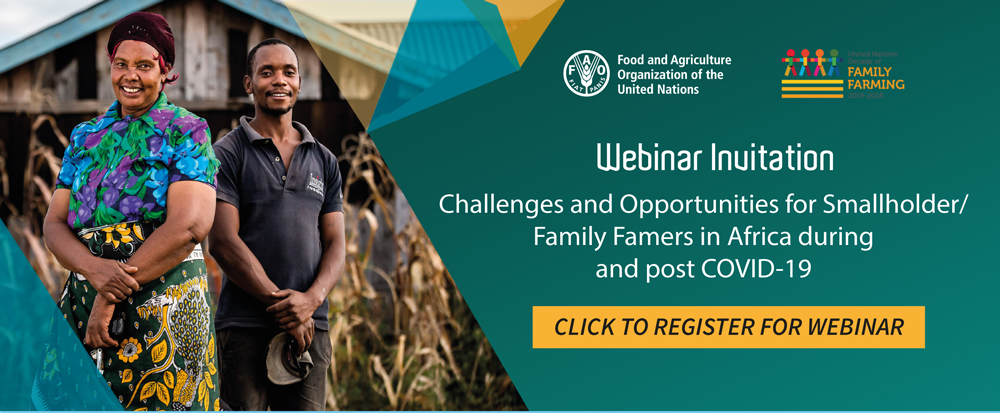This webinar will share knowledge, in-depth analysis and best practices of smallholder/ family farmers, fisher folks, pastoralists, youth and women in Africa in the light of COVID-19 pandemic as well as past experiences such as EVD in West Africa, 2008 International Food Crisis
When: 16 June 2020 at 9.00-10.30 am GMT/West Africa, 10.00-11.30am Central Africa, 11.00am-12.30pm Southern Africa and 12.00noon-1.30pm East Africa
Where: Zoom with simultaneous interpretation in English and French
https://fao.zoom.us/webinar/register/WN_Ir-_YcBTSYO5JxidGdQgpQ
Background
The unprecedented COVID-19 pandemic and various measures taken by the Governments to safeguard the spread of virus, including restriction of movements of people and goods have been affecting the food and agriculture sector in Africa. The Global Report on Food Crises (GRFC) 2020 published by Global Network Against Food Crises and Food Security Information Network showed that 73 million people in Africa were already acutely food-insecure in Crisis or worse (IPC/CH Phase 3 or above) due to conflict/insecurity, weather extremes, desert locusts, economic shocks before the global crisis of the COVID-19 pandemic. There is high risks that COVID-19 pandemic might further worsen the situation if no urgent and effective actions are taken.
There is substantial evidence that policy actions taken to slow the spread of COVID-19 have led to disruptions in food supply chain in Africa. Such actions, including road blocks and sanitary checks have led to losses of in quality or to complete damage of perishable products and to the accumulation of non-perishable products, closing slaughterhouses also resulted in losses. As countries enter into harvesting and post-harvest handling season in Eastern and Southern Africa and into planting season in Central and Western Africa, it is of paramount importance to ensure the timely access by smallholder/ family famers and produces to productive assets including land and water, both input and output market, as well as finance and agricultural extension services, while ensuring the safety and social distancing measures of agri-food value chain actors.
Farmers Organizations/ Cooperatives, Rural Institutions, and Civil Society will play indispensable roles (i) to provide necessary support and above-mentioned services to the members, in particular, smallholder farmers, youth and women; (ii) to advocate and bring up voices of millions of smallholder/ family farmers/ producers to policy makers, monitoring situation, identifying bottlenecks and proposing solutions and also to share best practices which could be replicable, adaptable to the contexts and scale-up across the countries.
Building on the discussions during the Africa Regional Civil Society Consultation organized autonomously and independently by the Civil Society in Africa with support by FAO last February 2020, as well as the CSM Webinar: Learning about the COVID-19 crisis in the CFS held on April 15, 2020, this webinar will provide an opportunity to bring the Civil Society in Africa and discuss challenges and opportunities for smallholder/ family farmers/ producers in Africa during and post COVID-19, as well as share the best practices to respond to the crisis and beyond.


